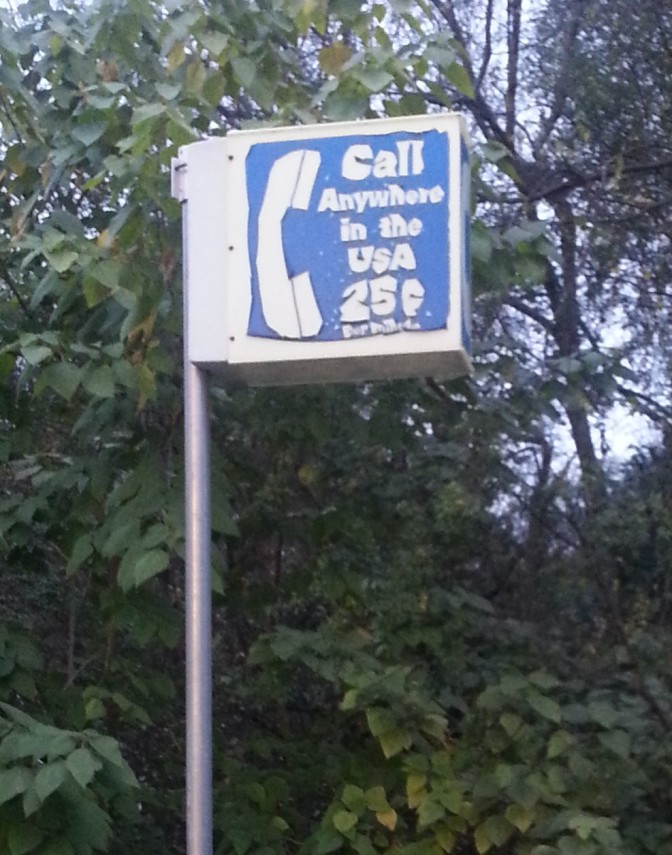 This year I entered the land of the living and bought a phone that was smarter than me. Similar to how I use my brain and my gym membership, I use my smartphone to about 10 percent of its capacity. Maybe.
This year I entered the land of the living and bought a phone that was smarter than me. Similar to how I use my brain and my gym membership, I use my smartphone to about 10 percent of its capacity. Maybe.
I text, I check email, I “like” friends’ statuses on Facebook, I monitor my blog posts, I drive by the voice of my GPS, and, occasionally, I make a phone call. Smartphones are the latest in a line of changes in communication I have seen in my short life.
Phone calls were once touted as “the next best thing to being there,” but, if you look around you now, we are using our phones even when we are together.
The other day, I was pumping gas and happened to look over the top of van and saw a sign indicating a pay phone.
“A pay phone today? Charging 25 cents?”
Granted, the sign looked a bit aged, but when I finished pumping, I had to check it out. I walked around the van — and then noticed that the sign was attached to a pole only; whatever form of pay phone it once offered no longer existed. Once was the day when a pay phone was a lifeline — especially if I was stranded somewhere. The lighted blue sign and Ma Bell offered hope. The possible need for a pay phone was the reason I always carried spare change in my purse. Of course, the phone booth hosting the pay phone was essential for Superman’s transformation from Clark Kent to superhero. And a pay phone was even a great tool for directing an insult:
“Got a dime? Call someone who cares.”
The last time I used a pay phone I was in the middle of the mall with my four small children. Rather than phone booths, the mall offered a sunken, bricked area with four alcoves to allow some privacy during those paid calls. Instead of coins, I used our long-distance code to make the local call; it was cheaper than the 35 cents required.
By the time the fifth child was speaking, I was using a cell phone when I was out and about. We had our “land line” at home, the cell phone when not, and no need for a pay phone. I don’t think my now 17-year-old youngest child ever has used a pay phone. The cell phone signaled its demise. The transformation of this one form of communication in even my lifetime has been phenomenal.
I remember:
Party lines. Some of my friends had one, which meant they shared a phone line with other homes; when they picked up the phone they could hear others talking and had to wait until the line was clear before they could make their call. (My parents always chose a private line — probably because having five children meant we were a large enough party already.)
Rotary phones. Until I was in fifth grade, we used rotary phones. Push button phones were incredibly fast — and I could play “Mary Had a Little Lamb” on them.
Long-distance calls. Once was the day when you paid dearly by the minute for a long-distance calls. Those calls were precious indeed. The advertising slogans “Reach out and touch someone” and “The next best thing to being there” rang true — literally — every time I got a call from someone I loved.
Collect calls. “You have a collect call from Sara. Will you accept the charges?” My parents always did even though they cost a pretty penny.
Traveling without a phone. Back in the day, when I arrived at a location some distance from home, I gave a courtesy call to let my parents or my husband know I’d made it safely. What happened between home and that location, however, was up to God and the reliability of my car — or the kindness of a perfect stranger. Yet I am still alive to tell about it.
1-800 numbers. Before we moved to cell phones, we used 1-800 numbers for long-distance bargain rates; we purchased a plan and maxed it out, making those long-distance calls. Minutes were still precious.
Cell phone minutes. Our first cell phones came with limited minutes but also “free” times to call. Depending on the plan, you could call before 7 a.m. or after 9 p.m., for instance, and talk for free. Weekends were also free. Until that time, phone etiquette suggested calling only between 9 a.m. and 9 p.m. and not allowing the phone to ring more than 10 times. With the move to cell phones and free minute plans, economy ruled over etiquette.
Land lines and computer phone lines. The power would go out but the phone would still work — because Ma Bell’s phone lines were independent of electricity. When our land line fees got out of range, we made the move to Magic Jack, a cheap alternative — though not perfect — enlisting the computer for phone service. Eventually, our home phone became supplanted by the cell phone; why call a house when you can call a person?
Texting. Before my husband and I got phones that allowed for texting, we didn’t understand the attraction. Now we do. It is much easier to send a text that can be retrieved at convenience than to interrupt a life for a phone call that could last and last and last.
The cell phone has transformed our lives — and ended the lives of public pay phones and, in numerous cases, land lines. A smartphone is transforming our lives even more so. Now I can have smart at my fingertips, even if I have (or lack) smarts otherwise. Just like the various versions of phone communications I experienced through my years, cell phones and smartphones are mere tools. How we use them determines their value.
Meanwhile, those Bell Telephone slogans are still in effect. We just can often “reach out and touch someone” while we are using “the next best thing to being there.”

